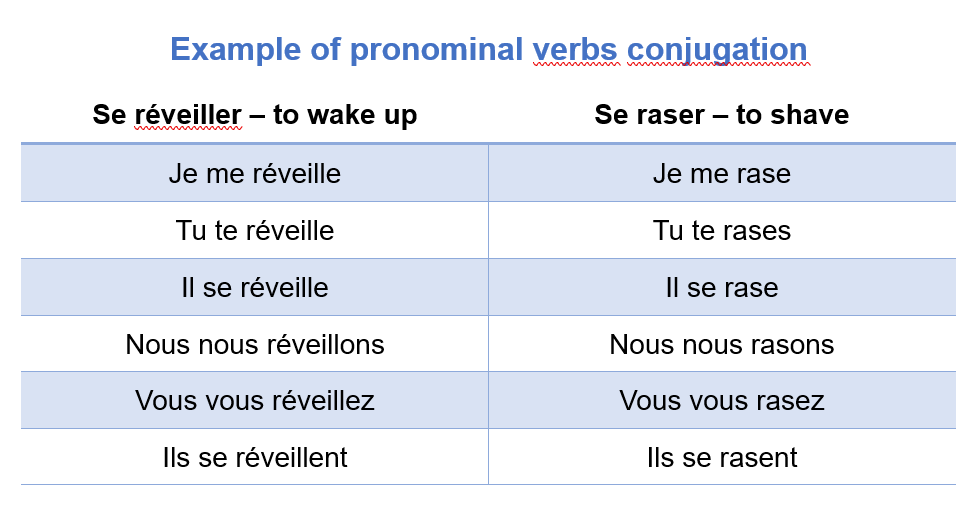
Pronominal verbs in French
What is a pronominal verb? That is the question! With many answers here like the essential points to remember about pronominal verbs and your favorite part: the practice!
What is a pronominal verb – 1st part?
The pronominal verbs in French are combined with a reflexive pronoun who is from same person as subject of the verb.
And pronominal verbs are therefore always made up of two elements: a pronoun and a verb itself. here are some well-known examples:
- Se laver = to wash,
- To take a walk = se promener
- To fall asleep = s’endormir
- To wake up = se réveiller…
We call the pronoun which precedes the verb a reflexive pronoun because it takes back the subject of the verb. This is why, with these verbs, we generally have the impression that the subject performs the action on himself. An example with the verb SE LAVER – present tense:
- Je me lave.
- Tu te laves.
- Il/Elle se lave.
- Nous nous lavons.
- Vous vous lavez.
- Ils/Elles se lavent.
As you can see, the presence of reflexive pronoun gives the feeling that the subject is doing the action on itself, which is also literally the case with the verb TO WASH = se laver.
It exists different types of pronominal verbs in French:
> reflexive pronominal verbs: se laver, se doucher, se lever…wash, shower, get up…
> reciprocal pronominal verbs: s’écrire, se sourire, s’embrasser…write to each other, smile to each other, kiss each other…
> subjective or unreflexive pronominal verbs: se moquer, se douter, se taire… to make fun, to suspect, to remain silent…
> pronominal verbs with passive meaning: se vendre, s’apprendre…to sell yourself, to learn yourself…
> verbs mainly pronominal: se souvenir, se méfier, s’abstenir…to remember, to be wary, to abstain…
We will study this later to understand more precisely the differences between these types of verbs.

Example of pronominal verbs in french
The essential things to remember about pronominal verbs
Here are the essential things namely regarding the use of pronominal verbs in French.
Unlike what we find in some languages, the reflexive pronoun pronominal verbs in French varies depending on the subject of the verb.
- Tu te réveilles. (et non: Tu se réveilles.)
- Je me douche. (et non: Je se douche.)
We must not forget to do the elision of the reflexive pronoun when necessary, that is to say before a vowel or a silent H.
- Je m’habilles.
- Ils s’écrivent.
It is also necessary to pay attention to the pronoun place in certain special cases, such as near future or to the imperative. For example:
- Je vais me promener.
- Dépêchez-vous!
The sense of a verb is perhaps different depending on whether or not it is in the pronominal form.
Tromper quelqu’un: abuser de la confiance de quelqu’un. / Deceive someone: abuse someone’s trust.
Se tromper: faire une erreur. / Be mistaken: to make a mistake.
Of course, for some verbs, the sense is identical:
- Laver quelque chose. = to wash something.
- Se laver. = To wash yourself.
All pronominal verbs are combined with the auxiliary BE to past tenses, as the perfect tense, the Past conditional where the past subjunctive. For example:
- Je me suis levé à 8 heures. I wake up myself at 8 a.m.
- Si j’avais su, je ne me serais pas levé. If I’d known, I wouldn’t have got up
- Je trouve étonnant qu’il se soit perdu. / I find it surprising that he got lost.
Pronominal verbs in French: exercises
You held the essential about the pronominal verbs in French? Well, here are two exercises to put your knowledge into practice!
Exercises
Exercise 1
Conjugate these pronominal verbs present tense.
Je (se doucher) tous les soirs. / I (shower) every night.
Tu (se lever) vers 8 heures./ You (get up) around 8 o’clock.
Marie (se coucher) à 23 heures. / Marie (go to bed) at 11 p.m.
Nous (se téléphoner) tous les dimanches. We (call each other) every Sunday.
Vous (ne pas se dépêcher) beaucoup! / You (do not hurry) very much!
Julien et Sylvie (s’inscrire) à l’université. / Julien and Sylvie (register) at university.
Exercise 2
Conjugate these pronominal verbs perfect tense.
Je (s’asseoir) sur le canapé. / I (sit) on the sofa.
Tu (se maquiller) pour sortir. / You (put on makeup) to go out.
Le professeur (se procurer) un bon livre. / The teacher (get) a good book.
Nous (se laver) avant de partir. / We (wash) before leaving.
You (stop) in front of this store.
Ils (se marier) en septembre. / They (get married) in September.
Correction of exercises
Exercise 1
- Je me douche tous les soirs.
- Tu te lèves vers 8 heures.
- Marie se couche à 23 heures.
- Nous nous téléphonons tous les dimanches.
- Vous ne vous dépêchez pas beaucoup!
- Julien et Sylvie s’inscrivent à l’université.
Exercise 2
- Je me suis assis(e) sur le canapé. (attention à l’accord du participe passé des verbes pronominaux)
- Tu t’es maquillé(e) pour sortir.
- Le professeur s’est procuré un bon livre.
- Nous nous sommes lavés avant de partir.
- Vous vous êtes arrêté(s) devant ce magasin. (si on vouvoie la personne, on ne met pas de S)
- Ils se sont mariés en septembre.
Pronominal Verbs – 2nd part
Reflective, reciprocal, subjective verbs… Oh là là …but no, don’t worry … All types of pronominal verbs are explained clearly and simply here, with examples and an exercise to avoid making mistakes on this point of French conjugation.
We are going to learn the different types of pronominal verbs
- Reflexive verbs
- Reciprocal verbs
- Subjective (or unreflective) verbs
- Pronominal verbs with a passive meaning
- Mainly pronominal verbs
- Exercises
The different types of pronominal verbs
1. Pronominal verbs are combined with a reflexive pronoun which is from the same person as the subject of the verb.
We will now focus more specifically on the 5 types of pronominal verbs, to know:
2. Reflexive pronominal verbs:
Se laver, se doucher, se lever…/ to wash, to shower, to get up…
3. Reciprocal pronominal verbs:
S’écrire, se sourire, s’embrasser… / to write to each other, ro smile to each other, to kiss each other…
4. Subjective or irreflexive pronominal verbs:
Se moquer, se douter, se taire… / To make fun, to suspect, to remain silent…
5. Passive pronominal verbs:
Se vendre, se savoir, se manger… / to sell yourself, to know yourself, to eat yourself…
6. Essentially pronominal verbs:
Se souvenir, se méfier, s’abstenir… / to remember, to be wary, to refrain…
Reflexive verbs
We are talking about reflexive verbs when the subject undergoes the action he does.
These are the most classic of reflexive verbs:
Se laver, se doucher, se lever, se coiffer… / to wash, to shower, to get up, to do your hair…
With the reflexive verbs, the subject therefore takes action on itself:
- Je me douche tous les matin avant de travailler. I shower every morning before working.
As you can see, the person showers themselves. We are therefore dealing with a pronominal verb with reflexive meaning.
Another example:
- Vous vous coiffez sans brosse à cheveux?! Do you comb your hair without hairbrush?!
Here too, the person does their own hair, although perhaps they do it with a little dynamite. 😀
Reciprocal verbs
We are talking about reciprocal pronominal verbs when the subjects undergo interaction.
In this case, beings exercise action on each other, hence the name “reciprocal verbs”. Here are some examples of widely used reciprocal verbs:
S’écrire, se sourire, s’embrasser, se disputer, se battre… / Write to each other, smile to each other, kiss each other, argue, fight…
Let’s look at an example right away:
- Jean et Françoise se sont embrassé discrètement./ Jean and Françoise kissed at each other discreetly.
As we see, Jean kissed Françoise, and Françoise kissed Jean. It is therefore indeed a reciprocal pronominal verb.
At the grammatical level, it should be noted that the reflexive pronoun of a reciprocal verb can have different functions. It can be for example COD or COI:
- Ils se sont parlés hier. They saw each other yesterday.
- Ils se sont écrit hier. / They wrote to each other yesterday.
In the first sentence, the reflexive pronoun SE is COD, while in the 2nd it is COI. This explains why we did the agreement of the past participle in the 1st sentence but not in the 2nd.
Subjective or unreflective verbs
With the subjective (or unreflective) pronominal verbs, the subject does not undergo the action which he performs.
These verbs are often followed by preposition DE, as you can see in the following list:
Se douter de, se moquer de, se jouer de, se taire, se passer de, se comporter de, se rire de… / To suspect, to make fun of, to play with, to be silent, to do without, to rush, to behave, to laugh at…
Let’s see an example:
- Audrey se doute de la fin. / Audrey suspects the end
If we analyze the sentence, we see that Audrey is not suspecting of herself, but of the end. The subject therefore does not undergo the action, it is a subjective pronominal verb.
Another example:
- Albert se moque des passants. / Albert laughs at passers-by.
Pronominal verbs with a passive meaning
With the pronominal verbs with a passive meaning, the subject undergoes the action but does not accomplish it.
Most verbs can be used this way. It is in fact a particular turn of the passive voice. Let’s see two examples:
- Le cuir se vend bien cette année! / the leather is sold good this year!
- Ce travail s’apprend facilement./ This work is learned easily.
Obviously, leather does not sell itself and the worj cannot be learned by itself either! It is indeed about pronominal verbs with passive meaning.
Compare, for example, these two sentences:
- Le rapport se lit bien. / The report is read well..
- Le rapport est bien lu. / The report is well read.
We can clearly see that these two sentences are passive.
Likewise, we often use the pronominal verb se faire in the passive voice:
- Le calcul se fait ainsi. / The calculation is as follows.
- Il se fait appeler Luc. / He goes by the name Luc.
Essentially pronominal verbs
Certain verbs only exist in the pronominal form: these are the mainly pronominal verbs.
Among these verbs, let us cite the most used:
S’exclamer, s’en aller, se souvenir de, s’accroupir, se méfier de, se réfugier, s’absenter, s’arroger, se désister, se repentir, s’abstenir de, s’écrier…/ To exclaim, to go away, to remember, to crouch, to distrust, to take refuge, to absent oneself, to arrogance, to desist, to repent, to abstain from, to cry out…
The verb SOUVENIR does not exist: there is only the verb se souvenir (to remember), which is therefore a verb essentially pronominal.
- Je me souviens de mon enfance. / I remember my childhood.
Let’s see two more examples:
- Il se réfugie chez le voisin. He takes refuge at the neighbor’s.
- Vous vous êtes absentés sans le dire. / You left without saying so.
Exercise on reflexive, reciprocal, subjective verbs…
It’s your turn to do these exercises to check your knowledge of pronominal verbs! You will find all types: reflexive, reciprocal verbs, etc.
Exercises
Conjugate these pronominal verbs in the past tense.
Marie-Christine (se coucher) très tard hier soir. / Marie-Christine (go to bed) very late last night.
Jean-Pierre et Claude (se voir) dans le restaurant L’Auberge./ Jean-Pierre and Claude (see each other) in the L’Auberge restaurant.
Tu (se souvenir) à temps de sa date d’anniversaire! / You (remember) his birthday in time!
René (s’abstenir) de dire ce qu’il pensait. / René (refrain) from saying what he thought.
Nous (se faire plaisir)!/ We (have fun)!
Il (se comporter) très mal devant les invités. / He (behave) very badly in front of the guests.
Le vin de Bordeaux (ne pas se vendre) très bien en 2021. / Bordeaux wine (not selling) very well in 2021.
Les enfants (se disputer) toute la matinée. / The children (arguing) all morning.
Correction
- Marie-Christine s’est couchée très tard hier soir.
- Jean-Pierre et Claude se sont vus dans le restaurant L’Auberge.
- Tu t’es souvenu à temps de sa date d’anniversaire!
- René s’est abstenu de dire ce qu’il pensait.
- Nous nous sommes fait plaisir!
- Il s’est comporté très mal devant les invités.
- Le vin de Bordeaux ne s’est pas vendu très bien en 2021.
- Les enfants se sont disputés toute la matinée.
Give the correct form of the verb indicated in parentheses
Tex et Tammy ne ______ pas avec leurs amis. (s’ennuyer)
Fiona dit à Tex: Tu ______ , mais moi, je vais travailler. (s’amuser)
Tammy dit à Fiona: tu ne vas pas ______ ? (se reposer)
Tex et Tammy ______ à Zilker Park. (se promener)
Tex: Tammy ne ______ jamais avec moi. (se fâcher)
Bette ______ toujours pour Tex. (se maquiller)
Tex: Je ne ______ pas. Je n’ai pas de cheveux. (se raser)
Bette demande à Fiona: Est-ce que tu ______ à minuit? (se coucher)
Corey: Mes amis et moi, nous ne ______ jamais les cheveux. (se brosser)
Edouard, à quelle heure est-ce que vous ______ le week-end? (se lever)
Corey ne ______ jamais avant midi. (se réveiller)
Edouard: Je ne ______ pas. Je suis un escargot. (se dépêcher)
Translation
Tex and Tammy don’t ______ with their friends. (s’ennuyer)
correct answer: are bored
Fiona says to Tex: You ______ , but I’m going to work. (s’amuser)
correct answer: t’amuses
Tammy says to Fiona: Aren’t you going to ______?
correct answer: rest
Tex and Tammy ______ in Zilker Park. (walk)
correct answer: walking
Tex: Tammy never ______ with me. (get angry)
correct answer: get angry
Bette ______ always for Tex. (make up)
correct answer: make up
Tex: I don’t ______. I don’t have any hair.
correct answer: shave
Bette asks Fiona: Do you ______ at midnight? (go to bed)
correct answer: go to bed
Corey: My friends and I never ______ brush our hair.
correct answer: we brush
Edouard, what time do you ______ get up at the weekend?
correct answer: you get up
Corey never ______ before noon. (wake up)
correct answer: wake up
Edouard: I don’t ______. I’m a snail.
correct answer: me dépêche
Solutions
Tex et Tammy ne ______ pas avec leurs amis. (s’ennuyer)
correct answer: s’ennuient
Fiona dit à Tex: Tu ______ , mais moi, je vais travailler. (s’amuser)
correct answer: t’amuses
Tammy dit à Fiona: tu ne vas pas ______ ? (se reposer)
correct answer: te reposer
Tex et Tammy ______ à Zilker Park. (se promener)
correct answer: se promènent
Tex: Tammy ne ______ jamais avec moi. (se fâcher)
correct answer: se fâche
Bette ______ toujours pour Tex. (se maquiller)
correct answer: se maquille
Tex: Je ne ______ pas. Je n’ai pas de cheveux. (se raser)
correct answer: me rase
Bette demande à Fiona: Est-ce que tu ______ à minuit? (se coucher)
correct answer: te couches
Corey: Mes amis et moi, nous ne ______ jamais les cheveux. (se brosser)
correct answer: nous brossons
Edouard, à quelle heure est-ce que vous ______ le week-end? (se lever)
correct answer: vous levez
Corey ne ______ jamais avant midi. (se réveiller)
correct answer: se réveille
Edouard: Je ne ______ pas. Je suis un escargot. (se dépêcher)
correct answer: me dépêche
Translation
Tex and Tammy don’t ______ with their friends. (s’ennuyer)
correct answer: are bored
Fiona says to Tex: You ______ , but I’m going to work. (s’amuser)
correct answer: t’amuses
Tammy says to Fiona: Aren’t you going to ______?
correct answer: rest
Tex and Tammy ______ in Zilker Park. (walk)
correct answer: walking
Tex: Tammy never ______ with me. (get angry)
correct answer: get angry
Bette ______ always for Tex. (make up)
correct answer: make up
Tex: I don’t ______. I don’t have any hair.
correct answer: shave
Bette asks Fiona: Do you ______ at midnight? (go to bed)
correct answer: go to bed
Corey: My friends and I never ______ brush our hair.
correct answer: we brush
Edouard, what time do you ______ get up at the weekend?
correct answer: you get up
Corey never ______ before noon. (wake up)
correct answer: wake up
Edouard: I don’t ______. I’m a snail.
correct answer: me dépêche
Voilà ! Now you know all about pronominal verbs. It’s up to you to play and use them. More you practice, more you will feel confortable.

